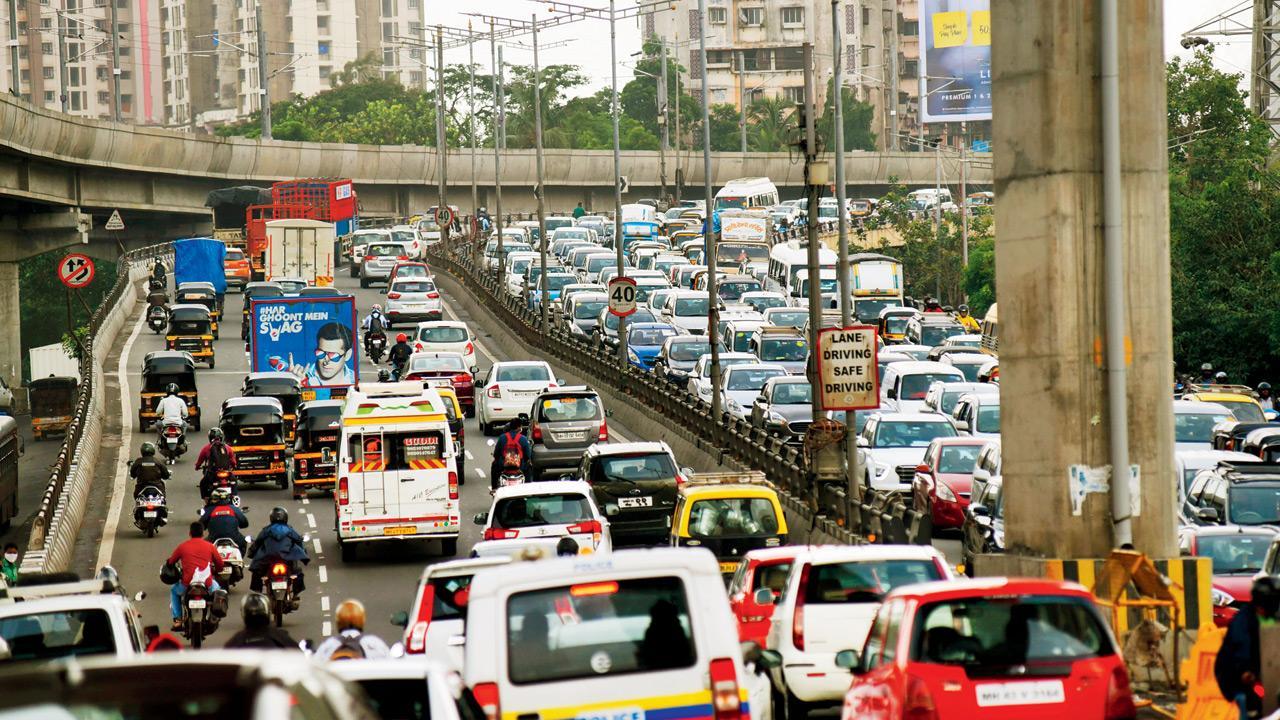Findings by SAFAR show drastic increase in 2.5 particulate matter due to the transport sector, suggests scrapping of old vehicles, introduction of the ones powered by electricity

Mumbai has over 11 lakh private cars and 24 lakh two-wheelers. File/Sameer Markande
Automobiles have become the biggest contributor to Mumbai’s deteriorating air quality, a study by System of Air Quality Weather Forecasting and Research has revealed. The share of PM2.5 vehicular emission was 30.5 per cent in 2019-20, up from 16 per cent in 2016-17, said SAFAR. The findings underscore the need for scrapping of old vehicles, promoting those powered by electricity and boosting mass transit systems.
ADVERTISEMENT
Maharashtra’s Economy Survey report for 2020-21 said Mumbai accounted for 10.3 per cent of the state’s vehicle registrations. The city’s vehicle density is now over 2,000 vehicles per km, an indicator of more traffic congestion and worsening air pollution in future. Mumbai has about 40 lakh vehicles with 11.6 lakh private cars and 24 lakh two-wheelers.
Air has suspended particulate matter of different sizes and PM 2.5 has a diameter not more than 2.5 micrometers (fine particles). It is small enough to invade the lungs.
The SAFAR study says industries and power sector contribute about 18 per cent towards PM2.5 emission, followed by 15 per cent from residential cooking in households and slums.
Dr Gufran Beig, senior scientist & founder project director at SAFAR, said, “Transport sector has shown a drastic increase over five years as a sector contributing to PM2.5 pollution in Mumbai. This is a combination of both an increase in the number of vehicles in Mumbai and more stagnation at traffic junctions leading to congestion.”
Compared to Delhi, Dr Beig said, the adoption of CNG is very less in Mumbai. “Majority of the vehicles continue to be petrol and diesel,” he said.
Anumita Roy Chowdhury, executive director-research and advocacy, Central for Science and Environment, bemoaned: “The city has not been able to leverage its overall public transport system both in terms of metro and suburban rail etc. to reduce the dependence on private vehicles.”
Sudhir Srivastava, former MPCB chairman, said a parallel large-scale source assessment exercise is being done by the National Environmental Engineering Research Institute. “Once it is published, we will compare the analysis to improve the city’s air quality.”
Dr Sanjeev Mehta, a pulmonologist, said, “Vehicles are literally blowing poison into our lungs. A few international studies have shown that lung functional analysis of people living within 1 km of main roads had much lower lung capacity than those living near arterial roads. Conducting a similar study in major cities like Mumbai will throw frightening results.”
 Subscribe today by clicking the link and stay updated with the latest news!" Click here!
Subscribe today by clicking the link and stay updated with the latest news!" Click here!






